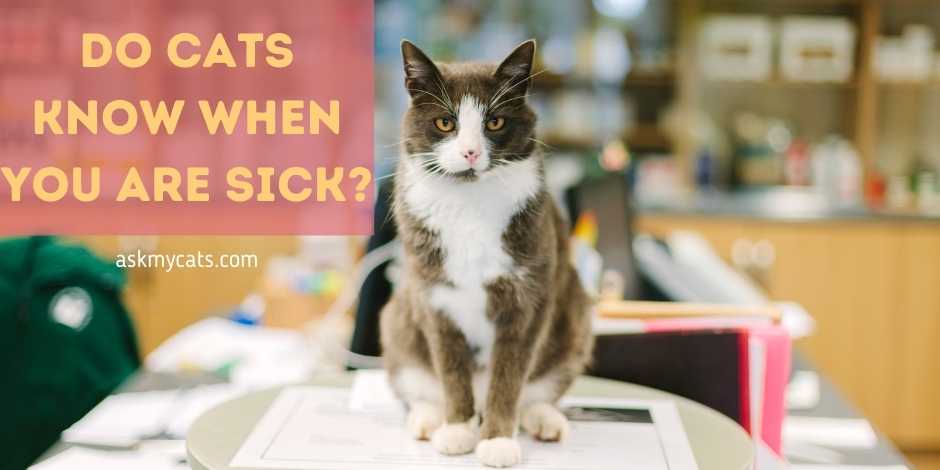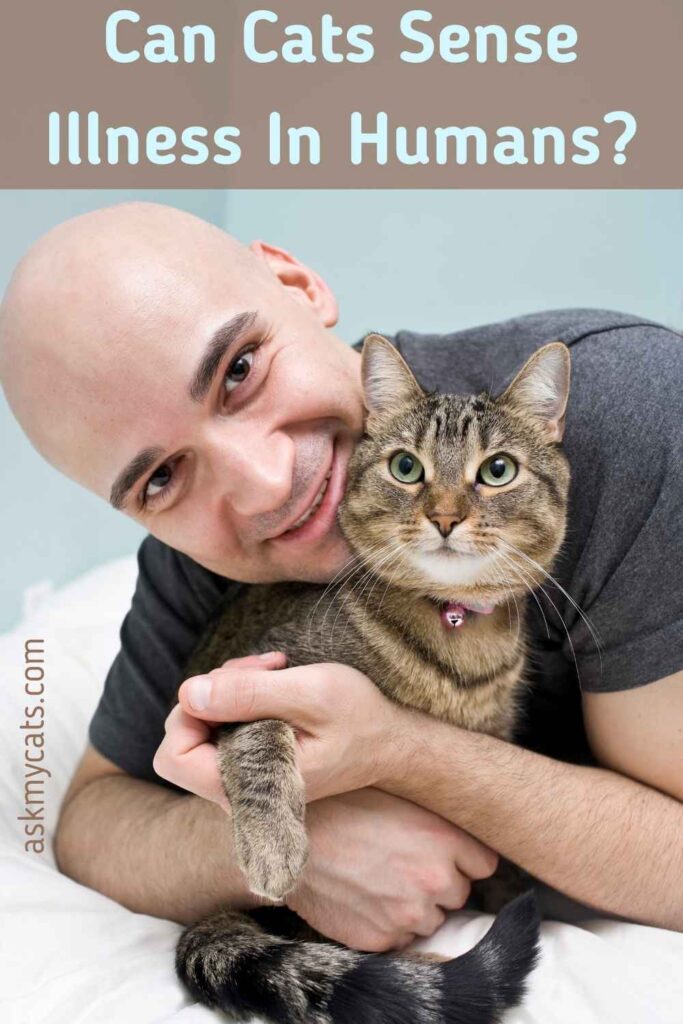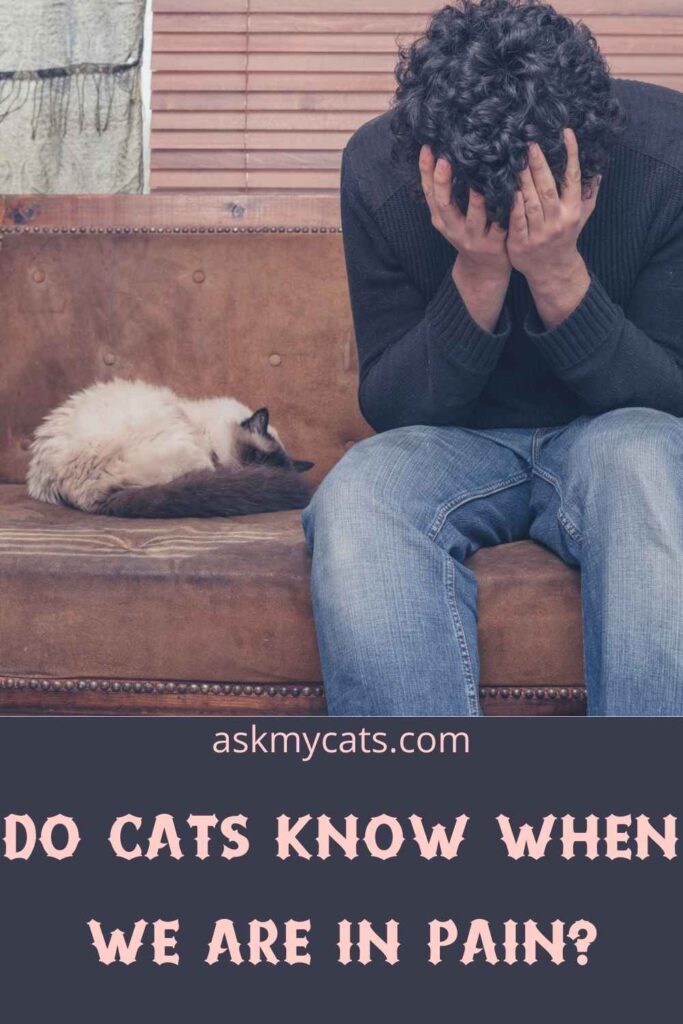Both dogs and cats have been known to save numerous lives by recognizing and distinguishing the scent of human disease through chemical changes.
Cats also have a keen sense of smell and may detect chemical changes in the body that are produced by sickness.
Cats can also detect shifts in attitude, behavior, and pattern that disrupt everyday routines.
They can also detect physical and psychological changes in behavior as a result of sickness.


Give Your Cat the Perfect Day
Get the Free Ebook!
Can Cats Sense Illness In Humans?
Cats, in particular, have an incredible sense of smell and can thus sense illness in humans.

They contain anything from 125 to 300 million smell receptors, depending on the breed, compared to humans who have about 5 million.
Cats can detect a variety of ailments, including epileptic convulsions and some forms of cancer, thanks to their acute and precise sense of smell and high level of awareness of the sorts of energy surrounding them.
It’s thought that our modern cat’s ancestral survival was contingent on knowing which of its members was unwell.
This is just my opinion, but it appears that they can tell by your mood, behaviors, and smell.
Sick individuals smell different, act differently, and have distinct emotions.
Since cats can infer your thoughts from your behaviors (or lack thereof) and your mood from the same process, it stands to reason that when you add the sense of smell and the altered energy, they will notice something is wrong and react appropriately.
Before I even noticed I was in agony, one of my cats would wrap up and cuddle the portion of me that was aching.
When the agony in my leg became excruciating, he would wrap his four paws over it, and when my head hurt, he would attempt to wrap himself around it.
Because he adopted a different position while I was in agony than when he was merely snuggling me, I believed he was attempting to help me by absorbing the agony. His approach was a resounding success!
When confronted with a smiling owner, the cats were substantially more likely to engage in “positive” behaviors such as purring, rubbing, and sitting on the lap of their owner.
When they were smiling, they also seemed to desire to spend more time with their owner than when the owner was frowning.
When the 12 cats were confronted with strangers instead of their owners, the pattern was radically different.
Regardless of whether the person was smiling or frowning, they displayed the same level of positive behavior in this situation.
The findings reveal two things: cats are able to interpret human facial emotions and this capacity may be learned over time.
You might also like to know about Do Cats Know When Baby Is Coming
Do Cats Know When We Are In Pain?
Cats can easily sense whether their owners are in pain because they share an extremely good bond among them.

Cats and their owners frequently establish incredible ties. Outsiders may find this unbelievable, but owners frequently claim that their beloved cats “know” when they are sick and act differently around them as a result.
That turns out it wasn’t such a bad idea after all.
Oscar, a cat who dwells at Steere House Nursing and Rehabilitation Centre in Rhode Island in the United States, acquired recognition for reportedly forecasting the deaths of twenty-five patients at the facility.
Oscar, who is usually distant, has been known to suddenly snuggle up fondly against select old men and women, who afterward pass away.
Oscar is most likely reacting to chemicals released by the bodies of the sick and dying, rather than displaying psychic abilities, according to a number of animal behavior specialists.
It is theorized that when the body closes down, biochemical signals are generated, which are detectable by cats and dogs before we notice a difference.
Obsessive sniffing or other strange expressions around a section of their owner’s body have been reported by dogs and cats to notify their owners of previously undiscovered malignant growths.
Cats have senses well beyond those of humans, with a sense of smell fourteen times greater than ours, allowing them to detect sickness through their increased sensory talents.
Even if they are affected by less serious illnesses, cats are likely to be able to detect a difference in their owners’ health to some level. Pets are great monitors of human behavior, regardless of any chemical cues.
The ill person’s behavior, as well as the behavior of others in the family toward them, may give indicators as to their weakened health.
Dogs have long been acknowledged to be adept at recognizing human facial emotions. However, this is the first conclusive proof that cats have the same ability.
When people are in a good mood, they are more likely to spoil a cat. Only one other research on cats’ capacity to detect human emotional expressions has been conducted previously.
It was published in January 2015 and yielded mixed results.
That does not imply that they are empathetic. People are more inclined to indulge a cat when they are in a good mood, thus it’s more probable that the cats had learned to correlate their owners’ smiles with rewards.
Even if cats don’t fully comprehend our emotions, the research reveals that they can detect remarkably subtle human movements.
Can Cats Sense Heart Attacks?
Cats appear to be able to detect some medical conditions, and they can detect heart attacks also.
Cats are extremely sensitive to their owners and are acutely aware of their distress.
There is a lot of evidence on the internet that supports the theory that a cat can feel disease in its carers by observing changes in their carers’ smell, behavior, mood, and habits.
I haven’t personally heard of cats being able to detect an approaching heart attack, but it doesn’t rule out the possibility.
Researchers informed delegates at the American Stroke Association’s International Stroke Conference in New Orleans last week that owning a cat might cut your risk of heart attack by nearly a third. Heart specialists and veterinarians have conflicting reactions to the discovery.
The discovery was the major conclusion of a ten-year study conducted by researchers at the University of Minnesota’s Stroke Institute in Minneapolis on more than 4,000 Americans.
Also, check out reasons behind cat suddenly walking like drunk
Can My Cat Tell If I Have Cancer?
Yes, cats detect cancer in their owner’s body. Cats appear to have the ability to detect illnesses such as cancer due to their superior olfactory discrimination.

However, because there is currently little study on the topic, it is impossible to state conclusively if a cat can detect cancer. Let’s hope that soon changes.
Anecdotal evidence suggests that cats may detect cancer in their owners. By constantly leaping on the diseased breast, a lady claimed that her cat alerted her to her breast cancer.
A guy said that his cat warned him about his lung cancer by dragging his paw along the left side of his body, where doctors discovered a huge tumor later.
These anecdotal stories are the only proof we have thus far. There have been no rigorous studies evaluating cats’ capacity to detect cancer, unlike dogs.
This might simply be due to the fact that cats, who are notoriously less food driven than their canine counterparts, find it more difficult to master such a talent.
If cats are capable of detecting cancer, it will very certainly be due to their sense of smell. While canines have a significantly greater sense of smell than cats, a cat’s sense of smell is significantly superior to that of a person.
According to one idea, their acute sense of smell enables them to detect changes in the body. Cats might be trained to detect cancer and use their strong noses in other ways, according to some researchers.
It wouldn’t hurt to tell your doctor if your cat seems to be particularly interested in one side of your chest on many occasions. It wouldn’t be the first time a cat alerted its owner to a tumor and saved its life.
Can Cats Sense High Blood Pressure?
Cats can detect a variety of signs associated with high blood pressure, often known as hypertension. These issues might be behavioral or medical.
Humans with hypertension frequently act irregularly, as though they are perplexed. Cats will be watching with bated breath.
Your pet will be accustomed to your schedule and will be perplexed as to why you are departing from the norm.
Furthermore, a raised heart rate is a clear indication of high blood pressure. This will be tough to ignore if your cat loves it. Your heartbeat will be heard by a cat who adores being handled and caressed.
Cats are aware of human heart rates and breathing patterns. It’s how they figure out when we’ll wake up, which is why cats seem to keep an eye on us as we sleep.
Check your blood pressure if your cat is fascinated by your heart rate. There will be a reason for your cat’s continued interest in this. Something has altered in your body, based on your actions.
Be aware that elevated blood pressure can lead to one of two outcomes. Purring and kneading are used by certain cats to help you relax.
Other cats will presume your heart is beating as a result of your fear. A nervous cat will react in such, escaping whatever it is that is bothering you.
Do Cats Know When You Are Dying?
Yes, cats can sense that human is dying. The human body experiences a variety of alterations as it approaches the end of life. To a cat, these are unmistakable. It will be tough to ignore the variety of clashing odors and hormonal fluctuations.
Cats that live in retirement homes or other similar environments are accustomed to this. The cat may go out of its way to find the scent of death.
This isn’t a morbidity exhibit. The cat anticipates what is to come and strives to soothe a chosen person.
This, like many things related to cats and illness, isn’t an exact science. Do not be alarmed if your cat has suddenly started sniffing, lying on you, and following you.
It’s possible that you’re merely smelling food or another animal.
Cats, on the other hand, are likely to have some grasp of the human life cycle. Cats have no option but to focus on the physical effects of imminent death. It would be impossible for their heightened senses to accept anything else.
Frequently Asked Questions
What do cats do when you are sick?
Sick cats frequently lie in a slumped stance, silently. They might not pay attention to their appearance. They might be purring, which cats do when they are pleased as well as when they are sick or in pain. A cat that is having trouble breathing may refuse to rest on his side and keep his head elevated.
Do cats know when you kiss them?
Some cats have been socialized to be held and kissed since they were kittens, while others haven’t and may be turned off by a kiss as a gesture of love. Allow your cat’s behavior to serve as a guide. If your cat snuggles up to you when you try to give it a head peck, it’s telling you that it’ll accept your attention.
Do cats get clingy when you’re sick?
Sick cats tend to retreat and hide, however, this might vary depending on the nature of the particular cat. Some cats become more clinging or needy, while others just get irritable. Cats that are unwell, on the whole, have decreased energy levels.
Final Words
Cats can detect illness in fellow felines through scent and behavior. This suggests that cats may also be able to detect sickness in humans by utilizing the same techniques.
Because cats have a better sense of smell than humans, they can detect illness in people by detecting hormone changes.
Cats are aware of facial emotions as well, so a pained grimace will not go ignored.
Sniffing, pawing, and kneading may be used by the cat to direct your attention to certain body areas.
